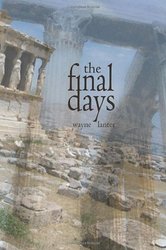THE FINAL DAYS by Wayne Lanter
Twiss Hill Press

A masterful combination of complex plotting and significant theme writing, where The Closing of the American Mind meets The Professor of Desire. Your dominant, egomaniacal protagonist (John Carter) is more likable than a Roth or Bellow professor, as his heightened humanity softens his aggressively intolerant intellectual side. Your readers can thoroughly enjoy the carefully interspersed revelations of plot and motivation. For instance, it takes hundreds of pages to find out who made a noise in the library one stormy day but the wait is made worthwhile.
We learn to respect and admire a protagonist who initially seems like a Hemmingwayesque drunk, womanizing bully of an academician, a professor of ethics without an ethical clue. In the true novel-as-process mode, however, we can soon see Carter as a victim, the last philosopher in Philistia, who actually does want to help the weak.
Significantly, Carter doesn't end the novel with another Lollita, but with a compassionate, paternal relationship with the son of his son Mason. Carter is an unrelenting atheist who sees no merit in funerals or Christmas carols. He totally lacks a spirituality to counter his anti-religiosity, but his compassion (even for his office plant, his tree, and the human vegetable at Murphy's) legitimizes his Socratic Ethics. Even though he's another American lone wolf, Rambo with a sheepskin, Carter is a unique and effective moral center here. There is some pathos in the coming-of-old-age mode and some brilliantly sardonic bombast, some effective slapstick humor (including the dog killing), and some genuinely thought-provoking issues. This is a wiry long novel, with almost no fat to trim, and an eloquent one.
Many strengths of the murder mystery genre are here in THE FINAL DAYS, but it is a novel too strong on theme to allow plot to dominate.
You may have given literature her most American professor, in that he's no screwed up Easterner with Old World baggage. He can watch a football game, own a handgun, eat fast food.
The story is clearly and profoundly put forth in an academic setting, where American culture ought to be exempt from all the assaults on Virtue, Quality, Integrity but where the macdonaldization of society hurts most. Some of your fine touches include naming the university Barker (as in a crass street vender or carnival promotion) and ending the novel on the open road like Huck on the wide and free Mississippi.
I. E. Mozeson